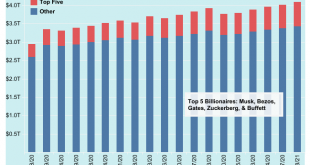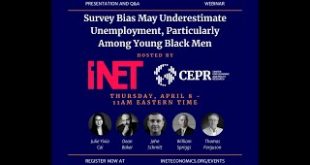from Theodore Lianos and current RWER issue The increasing intensity of the environmental problems that we face as a global community for the last fifty years has led to the development of several important ideas and proposals regarding the systemic changes that may be introduced in order to reverse the existing tendencies. Most prominent among them are the Steady-State Economy (Daly, 1972), the Green Growth Economy or Green Economy (OECD, 2015, 2011; UN, 2012), the ideas of Degrowth...
Read More »Patents and the pandemic: Can we learn anything?
from Dean Baker I realize that I may seem obsessed with the topic of patents (and copyrights), but it really is a big deal, and few people seem to appreciate the issue in its larger economic context. I have written about the inefficiency and corruption associated with these monopolies for decades, but if there was ever a time when public attention should be focused on reforming the system, it is now. With the pandemic costing millions of lives around the world, and costing our economies...
Read More »Tony Lawson and the nature of heterodox economics
from Lars Syll Lawson believes that there is a ‘coherent core’ of heterodox economists who employ methods that are consistent with the social ontology they implicitly advance. However, Lawson also acknowledges that many also use mathematical modelling, a method that presupposes a social ontology that is in severe tension with it. Therefore, I repeat, Lawson proposes that heterodox economists in fact exist in two groups, those who use methods consistent with the social ontology they are...
Read More »U.S. billionaires profit from 10 months of pandemic
Webinar: Survey Bias May Underestimate Unemployment, Particularly Among Young Black Men
Economists Julie Yixia Cai and Dean Baker present their new study showing how the high and rising non-response rate in the Current Population Survey (CPS) may underestimate unemployment for less advantaged workers, particularly young Black men. The CPS is the underlying source of many official labor market statistics, as well as income and poverty measures, and health insurance coverage. As discussants, economists William Spriggs and John Schmitt will explore the impact of bias in the CPS,...
Read More »The “trickle down” assumption
from Ted Trainer and current RWER issue The basic justification for conventional development is that although it mostly enriches the rich, in time “…wealth will trickle down to benefit all.” There is indeed a tendency for this to happen, but there are several reasons for rejecting this strategy. Little trickles down In the global economy the amount of benefit that trickles down is evident in the fact that one-fifth of the world’s people now receive about 70 times the amount of income the...
Read More »World map of COVID-19 deaths per capita by country
Source: https://en.wikipedia.org/wiki/COVID-19_pandemic_by_country_and_territory
Read More »China’s dash for technological leadership
from C. P. Chandrasekhar and Jayati Ghosh For quite some time, China was seen as a ‘threat’ by virtue of being a global manufacturing hub, embedding knowledge in production and riding on its cheap labour force and large volumes of foreign investment, to win a disproportionate share of global markets. But more recent declarations from official Western sources focus on the threat stemming either from China’s illegal appropriation or theft of intellectual property, or knowledge for...
Read More »World map of the Gini coefficients by country.
Source: https://en.wikipedia.org/wiki/List_of_countries_by_income_equality
Read More »Financialisation and bureaucracy have perverted higher education
from Steve Keen and RWER current issue Steve: Yes, the financialisation of higher education has gone hand in hand with the growth of bureaucracy. More than all of the money raised from student loans has gone into the black hole of administration, so despite the increase in funding, there is less money going to education now than when universities were fully funded by the state. This has also perverted the educational process, for both administrators and students. Whereas administrators...
Read More » Real-World Economics Review
Real-World Economics Review






